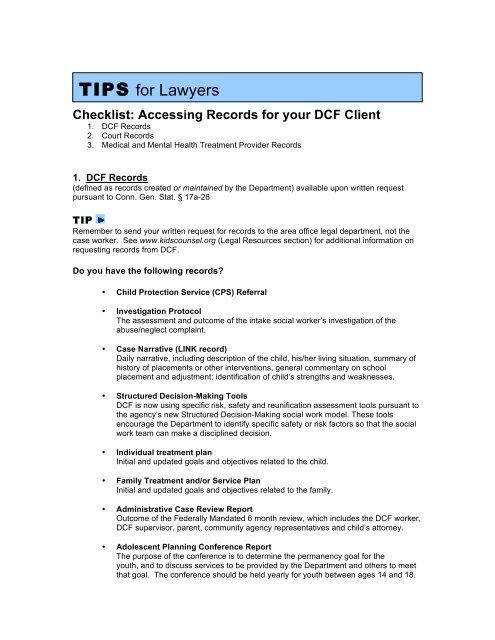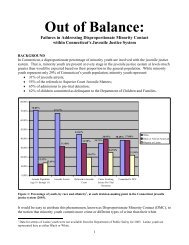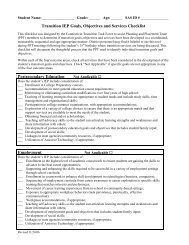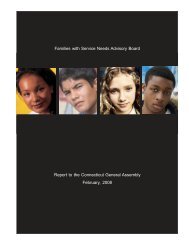Juvenile Records TIP Sheet
Juvenile Records TIP Sheet
Juvenile Records TIP Sheet
Create successful ePaper yourself
Turn your PDF publications into a flip-book with our unique Google optimized e-Paper software.
<strong>TIP</strong>S for Lawyers<br />
Checklist: Accessing <strong>Records</strong> for your DCF Client<br />
1. DCF <strong>Records</strong><br />
2. Court <strong>Records</strong><br />
3. Medical and Mental Health Treatment Provider <strong>Records</strong><br />
1. DCF <strong>Records</strong><br />
(defined as records created or maintained by the Department) available upon written request<br />
pursuant to Conn. Gen. Stat. § 17a-28<br />
<strong>TIP</strong><br />
Remember to send your written request for records to the area office legal department, not the<br />
case worker. See www.kidscounsel.org (Legal Resources section) for additional information on<br />
requesting records from DCF.<br />
Do you have the following records?<br />
• Child Protection Service (CPS) Referral<br />
• Investigation Protocol<br />
The assessment and outcome of the intake social worker’s investigation of the<br />
abuse/neglect complaint.<br />
• Case Narrative (LINK record)<br />
Daily narrative, including description of the child, his/her living situation, summary of<br />
history of placements or other interventions, general commentary on school<br />
placement and adjustment; identification of child’s strengths and weaknesses.<br />
• Structured Decision-Making Tools<br />
DCF is now using specific risk, safety and reunification assessment tools pursuant to<br />
the agency’s new Structured Decision-Making social work model. These tools<br />
encourage the Department to identify specific safety or risk factors so that the social<br />
work team can make a disciplined decision.<br />
• Individual treatment plan<br />
Initial and updated goals and objectives related to the child.<br />
• Family Treatment and/or Service Plan<br />
Initial and updated goals and objectives related to the family.<br />
• Administrative Case Review Report<br />
Outcome of the Federally Mandated 6 month review, which includes the DCF worker,<br />
DCF supervisor, parent, community agency representatives and child’s attorney.<br />
• Adolescent Planning Conference Report<br />
The purpose of the conference is to determine the permanency goal for the<br />
youth, and to discuss services to be provided by the Department and others to meet<br />
that goal. The conference should be held yearly for youth between ages 14 and 18.
• Educational Reports<br />
DCF is required by federal law to maintain records regarding child’s educational<br />
needs in case file. Available records should include the child’s Individualized<br />
Education Plan (if the child is receiving special education services).<br />
• Medical<br />
<strong>Records</strong> from child’s primary care physician, report from Multi-disciplinary evaluation<br />
performed 30 days after child placed in DCF care, Birth to Three Evaluation.<br />
• Psychiatric and Psychological Reports<br />
Results of psychiatric examination and medications given, psychological testing not<br />
ordered through the school system; reports from residential treatment centers, day<br />
treatment programs, therapeutic mentor reports, or other treatment settings.<br />
<strong>TIP</strong><br />
Remember to request each record by name, otherwise you will only receive the Running<br />
Narrative.<br />
2. Court <strong>Records</strong><br />
(available to child’s counsel pursuant to C.G.S. § 46b-124)<br />
• Petitions<br />
Filings in support of Orders of Temporary Custody; Neglect Adjudications;<br />
Termination of Parental Rights.<br />
• Summary of Facts<br />
State allegations filed in support of Neglect Petitions.<br />
• Status Reports<br />
Description of child and family’s current situation, recommendation for future agency<br />
or court action.<br />
• Permanency Plans<br />
Motions and supporting reports filed by the state in which DCF recommends a future<br />
permanent living arrangement for the child. Any party may file an objection to a<br />
permanency plan within 30 days.<br />
• Court Memorandum<br />
Details what orders were entered at a particular hearing.<br />
<strong>TIP</strong><br />
If you want a copy of the Court memorandum, you must ask the court to order<br />
the clerk’s office to make a copy.<br />
• Social Studies<br />
Descriptions of present living situation, birth family history, home studies related to<br />
placements.<br />
• Psychiatric and Psychological Evaluation Reports
The parties or the court, sua sponte, may order the party/ies to submit to a<br />
psychological or psychiatric evaluation, including a parent/child interactional<br />
evaluation to assist the court in making decisions regarding the future of the case.<br />
These reports will be done through the court services office and copies of the reports<br />
will be provided to all counsel of record.<br />
3. Medical and Mental Health Treatment Provider <strong>Records</strong><br />
• Child’s counsel should access information and/or records from any community<br />
agency providing treatment to the child client.<br />
<strong>TIP</strong><br />
It should be noted that if DCF acquires these records, then child’s counsel can obtain the<br />
records from DCF pursuant to C.G.S. § 17a-28. However, the DCF records statute does<br />
not provide the child’s attorney with the right to records created and maintained by a third<br />
party provider agency. Currently, providers will ask the child’s attorney for a written<br />
authorization for records. Attorneys may find it useful to keep standard health information<br />
releases in their files and have DCF sign them at the appropriate court hearing or<br />
conference.
















